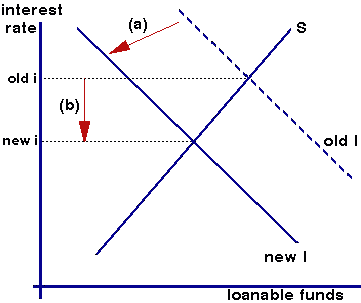A while back I read
the above mentioned book (get it online for free!) and wrote down some of
my thoughts as I went along (though not in a structured or coherent manner). Here they are for anyone who is interested, and
even for those who are not.
I had heard of
John Maynard Keynes before; by which I mean I had read his name in passing many
times, from many sources. But I didn’t know that much about the man, what the
eponymous form of
Keynesian Economics described; what’s more I didn’t even know how to say his name! (I still don’t)
 |
| Shockingly graphs like this have not helped |
But the man seemed remarkably prescient in deducing how
events would come to pass in the world, particularly when he adopted a tone of
pessimism.
When discussing the role of the embryonic League of Nations, he is sceptical of its ultimate
effectiveness, and in his analysis hits upon many points which could arguably
be applied to the faults inherent in todays United Nations.
“But the League will operate, say its supporters, by its
influence on the public opinion of the world, and the view of the majority will
carry decisive weight in practice, even though constitutionally it is of no
effect. Let us pray that this be so. Yet the League in the hands of the trained
European diplomatist may become an unequalled instrument for obstruction and
delay. The revision of Treaties is entrusted primarily, not to the Council,
which meets frequently, but to the Assembly, which will meet more rarely and
must become, as any one with an experience of large Inter-Ally Conferences must
know, an unwieldy polyglot debating society in which the greatest resolution
and the best management may fail altogether to bring issues to a head against
an opposition in favor of the status quo.”
Being written prior to World War II, it is also interesting
to note the language used when referring to the war itself.
I was previously interested to learn that World War I was
called the First World War long before there was a second to compare it to. I had always as a child accepted
the two as a combined set forming a part of our history. A view further
reinforced during later years when you learn a bit more about the conflicts, in
particular how linked they were. Then noticing more memorials around town (old
British Empire colonies have more World War I memorials than they do World War II),
the title of the Great War embedded in my mind that this was the name given
before it was revealed that history had more in store.
However the true genesis of the term First World War isn’t
one of comparing events, but rather of defining events. It was the ‘first’
world war. Not the first in a series, but the first ever to come to pass. Many
hoped it would be the only (hence the sadly defunct moniker; The War to End All
Wars), but at the time it was considered momentous that the whole worlds focus
could be turned toward conflict (even though it really wasn’t the whole world
anyway).
 |
| Though i guess it was pretty close (axis in orange, allies in green) |
But anyway, back to the more direct point.
I was interested to note that Keynes at times refers to the
First World War as a European world war (or European civil war). Whether or not
he believes this to be the case isn’t certain, however he makes it clear that this
is what the French government (in particular their Prime Minister Clemenceau) believed the conflict to be. Clemenceau
saw the war as a continuation of European civil wars, a pattern which had transpired
in the past (there is a lot of reference to the
war of 1870, in which Germany defeated France), and was destined to
continue in the future. As such the French leader was determined to break
Germany’s backbone, in order to ensure that its victory, which he considered as
but one in a long line of battles, would be more lasting.
Strange to think that such actions wishing to prevent
Germany’s future victories over France more likely fuelled on their ultimate
defeat in World War II.
Reading this analysis, one can’t help but feel that
Germany’s ultimate breaking of the treaty, and subsequent resurgence, was all
but a certainty given the strains it was put under. This isn’t to say that Hitler’s
rise was foreseeable, or justified. But when one considers that the nation of
Germany was left with the choice of either surrendering any foreseeable surplus
or profit for a generation, or else breaking the treaty; what population
wouldn’t choose the later? The fact that such animosity had been created between
Germany and her captors only helped to foster an environment where the more
unsavoury members of society could more easily hoist their views and remain
within the scope of public thought.
With the full weight of historical events such as the great
depression, and World War II, falling just shy of this account, one can’t help
but view everything that Keynes talks about through this odd prism of
foresight.
Keynes predicts the malaise about to grip the world’s
economy. He sees the inherent problems within the League of Nations, and
understands that if the treaty of Versailles isn’t altered, that the
consequences would not only be dire for Germany, but for Europe, and perhaps
the world as a whole.
Indeed, his arguments were so persuasive that they affected
public opinion both in England and the United States.
The English public began to think of the Treaty’s terms as a
sort of Carthaginian Peace, and felt that Germany had been hard done by. Such
sentiments would later go on to help establish the ill-informed policy of
appeasement adopted by Chamberlain in the lead up to World War II.
Again it is odd to think that measures made with seemingly
good intentions can lead to such horrible consequences. First a French desire
to avoid future defeat at the hands of Germany brings about a future French
defeat, and then a British desire to atone to Germany for their harsh treatment
allows Germany to commit crimes more horrible than it was originally being chastised
for.
Closing off his chapter on Europe after the Treaty, Keynes
foresees the economic turmoil that would give birth too Nazism:
“Economic privation proceeds by easy stages, and so long as
men suffer it patiently the outside world cares little. Physical efficiency and
resistance to disease slowly diminish, but
life proceeds somehow, until the limit of human endurance is reached at last
and counsels of despair and madness stir the sufferers from the lethargy which
precedes the crisis. Then man shakes himself, and the bonds of custom are
loosed. The power of ideas is sovereign, and he listens to whatever instruction
of hope, illusion, or revenge is carried to him on the air”
“But who can say how much is endurable, or in what direction
men will seek at last to escape from their misfortunes?”
You can almost hear the jackboots.
Similarly as reading a text written in the period between
last centuries two major conflicts inevitably leads one to view the writing in
a light it was not exactly mean to be read in, I can’t help but apply some of
the writings to one of this centuries budding defining events; the rise of
China.
True there is not much said in Keynes work about China, nor
is China’s current economic growth something that is only confined to the 21st
century, but nevertheless I found this passage bringing images of China to mind
when I read it:
“The great events of history are often due to secular
changes in the growth of population and other fundamental economic causes,
which, escaping by their gradual character the notice of contemporary
observers, are attributed to the follies of statesmen or the fanaticism of
atheists.”
Chinas rise has always seemed to me to be a simple matter of
demographics. When you have 20% of the world’s population within your borders,
you can’t be held down forever. And though its ‘rise’ seems to have caught a
few people off guard, it definitely seems to have accomplished this through a
gradual nature.
Then there were passages which evoked similar descriptions
of the world as it appears to some today:
“Europe was so organized socially and economically as to
secure the maximum accumulation of capital. While there was some continuous
improvement in the daily conditions of life of the mass of the population,
Society was so framed as to throw a great part of the increased income into the
control of the class least likely to consume it. The new rich of the nineteenth
century were not brought up to large expenditures, and preferred the power
which investment gave them to the pleasures of immediate consumption. In fact,
it was precisely the inequality of the distribution of wealth which made
possible those vast accumulations of fixed wealth and of capital improvements
which distinguished that age from all others. Herein lay, in fact, the main
justification of the Capitalist System. If the rich had spent their new wealth
on their own enjoyments, the world would long ago have found such a régime intolerable.
But like bees they saved and accumulated, not less to the advantage of the
whole community because they themselves held narrower ends in prospect.”
Is this accumulation of wealth by small percentages what
lead to the great depression, and what is now worrying people in places like
America?
I also found it interesting how Keynes talks of the American
President’s inability to hold his own during chamber debates. I have often
heard people in the United States bemoan their politician’s lack of ability in this
regard, especially when compared to politicians accustomed to the Westminster System,
or equivalent, where their ability is forged in the crucible of question time.
This perhaps is why Americans were so impressed with Gillard’s recent flaying
of Abbots sexism.
 |
| I couldn't resist |
I also enjoyed a few quotes I figured were worth repeating
here.
“Thus this remarkable system depended for its growth on a
double bluff or deception. On the one hand the labouring classes accepted from
ignorance or powerlessness, or were compelled, persuaded, or cajoled by custom,
convention, authority, and the well-established order of Society into
accepting, a situation in which they could call their own very little of the
cake that they and Nature and the capitalists were co-operating to produce. And
on the other hand the capitalist classes were allowed to call the best part of
the cake theirs and were theoretically free to consume it, on the tacit
underlying condition that they consumed very little of it in practice. The duty
of "saving" became nine-tenths of virtue and the growth of the cake
the object of true religion. There grew round the non-consumption of the cake
all those instincts of puritanism which in other ages has withdrawn itself from
the world and has neglected the arts of production as well as those of enjoyment.
And so the cake increased; but to what end was not clearly contemplated.
Individuals would be exhorted not so much to abstain as to defer, and to
cultivate the pleasures of security and anticipation. Saving was for old age or
for your children; but this was only in theory,—the virtue of the cake was that
it was never to be consumed, neither by you nor by your children after you.”
The cake is real.
“As lately as 1890 Europe had a population three times that
of North and South America added together”
Wow.
When talking of rhetoric and the art of argument, Keynes
offers this interesting bit of insight:
“A moment often arrives when substantial victory is yours if
by some slight appearance of a concession you can save the face of the
opposition or conciliate them by a restatement of your proposal helpful to them
and not injurious to anything essential to yourself.”
I just found it interesting.
“In fact,
here, as elsewhere, political considerations cut disastrously across economic.
In a régime of Free Trade and free economic intercourse it would be of little
consequence that iron lay on one side of a political frontier, and labor, coal,
and blast furnaces on the other. But as it is, men have devised ways to
impoverish themselves and one another; and prefer collective animosities to
individual happiness”
Also, billions are referred to
by Keynes as ‘milliards’. Nice
Well that’s pretty much all I have
to say. Has anyone else read this, and if so, what were your thoughts?
Cheers
MM












